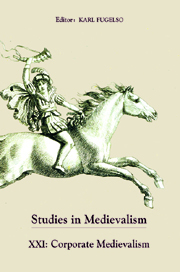Book contents
- Frontmatter
- Acknowledgments
- Contents
- Title in the Series
- Editorial Note
- I Corporate Medievalism: Some Perspective(s)
- II Interpretations
- Historicizing Neumatic Notation: Medieval Neumes as Cultural Artifacts of Early Modern Times
- Hereward the Dane and the English, But Not the Saxon: Kingsley's Racial Anglo-Saxonism
- From Romance to Ritual: Jessie L. Weston's Gawain
- The Cinematic Sign of the Grail
- Destructive Dominae: Women and Vengeance in Medievalist Films
- III Response
- Notes on Contributors
- Title in the Series
Hereward the Dane and the English, But Not the Saxon: Kingsley's Racial Anglo-Saxonism
from II - Interpretations
Published online by Cambridge University Press: 05 February 2013
- Frontmatter
- Acknowledgments
- Contents
- Title in the Series
- Editorial Note
- I Corporate Medievalism: Some Perspective(s)
- II Interpretations
- Historicizing Neumatic Notation: Medieval Neumes as Cultural Artifacts of Early Modern Times
- Hereward the Dane and the English, But Not the Saxon: Kingsley's Racial Anglo-Saxonism
- From Romance to Ritual: Jessie L. Weston's Gawain
- The Cinematic Sign of the Grail
- Destructive Dominae: Women and Vengeance in Medievalist Films
- III Response
- Notes on Contributors
- Title in the Series
Summary
Charles Kingsley belongs to that particular class of nineteenth-century gentleman who was extraordinarily famous in his own time, but who has since faded into relative obscurity. When he is now remembered, it tends to be for his children's book The Water-Babies, or for his controversial debate with John Henry Newman. What is rarely remembered is that Kingsley held the Regius Chair of Modern History at Cambridge for nine years, starting in 1860. “Modern History” meant post-classical, and so in these years, Kingsley engaged directly in the discourse of medieval English and Old North studies, producing a significant work of early medieval history: a series of lectures on the interactions between the Germanic tribes and the Roman Empire, which was subsequently published in 1864 under the title The Roman and the Teuton. In the same period, he also produced an equally important work of historiography: a Conquest-era romance about the English resistance fighter Hereward the Wake. This potent position as popular fiction writer, with one foot nonetheless firmly grounded in the discourse of medieval studies, establishes him as a perfect example of what Allen J. Frantzen calls a “gatekeeper” of medieval knowledge, someone who selectively filters and transmits this knowledge to popular audiences. One of the most important aspects of this gatekeeping comes in terms of his racial medievalism, and more specifically, his racial Anglo-Saxonism. This article has, therefore, two main focuses: first, the influence of medieval studies on Kingsley's theorizations of the English race, and second, his transmission of this racial thinking to broader audiences via The Roman and the Teuton and Hereward the Wake: “Last of the English.”
- Type
- Chapter
- Information
- Studies in Medievalism XXICorporate Medievalism, pp. 89 - 118Publisher: Boydell & BrewerPrint publication year: 2012

